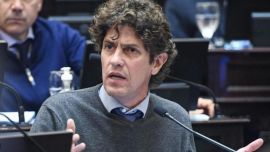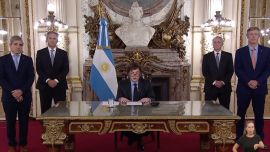President Nicolás Maduro said Tuesday he is ready to seek re-election after his allies pushed forward voting in a move widely seen as a bid to capitalise on disarray in the Venezuelan opposition and consolidate power amid a free-falling economy.
Maduro's comment came hours after the govenrnment-controlled Constitutional Assembly – a legislature that’s been denounced the international community –ordered a presidential election be held by the end of April. The suggested timescale raised eyebrows – an April election would be months ahead of when the country's presidential voting has traditionally taken place.
Venezuela’s president said the ruling United Socialist Party of Venezuela (PSUV) would settle on a single consensus candidate at a convention February 4. Maduro said that if selected – there is little doubt he will be – he would relish the opportunity to measure up against his opponents. He called on the National Electoral Council to set as near a date as possible for the presidential election.
"They should find the closest date, to get this out of the way so we can begin to make a great revolution," a jubilant Maduro told hundreds of redshirted supporters at a rally to commemorate the 60th anniversary of the end of Venezuela's last military dictatorship. "If it was in my hands, the election would be this weekend."
While Venezuelans had been expecting an early election, the announcement came as somewhat of a surprise because talks between the opposition and government have been taking place in the Dominican Republic for weeks — so far without a breakthrough. The opposition has been using those talks to push for guarantees that voting will be free and fair, with the participation of independent foreign monitors.
Criticism
Foreign ministers from 14 mostly conservative Latin American governments meeting in Chile to discuss Venezuela criticised the announcement of an early election, saying in a harshly worded statement that it was "impossible" for the ballot's outcome to be credible under current conditions.
Mexico, one of several foreign governments mediating the talks in the Dominican Republic, said it was withdrawing its support for the talks to protest the Maduro government's move.
Speaking in Russia, Argentina President Mauricio Macri called Venezuela “a regime where constitutional guarantees and human rights are not respected."
When asked about Maduro running for another six-year term, US State Department spokeswoman Heather Nauert said, "I don't think that's a good idea."
Maduro seemed unfazed by the threat of more international rebuke. He settled on a frequent refrain to accuse his opponents of taking orders from the Donald Trump administration, which has slapped financial and travel restrictions on dozens of top Venezuelan officials in recent months, including Maduro himself.
"Don't go running," Maduro taunted his opponents during the rally. "Don't abandon Venezuela's democracy."
Maduro was accompanied at the rally by Diosdado Cabello, the number two leader of the PSUV. It was Cabello, seen as Maduro's biggest internal rival, who earlier Tuesday proposed holding the election by the end of April, saying it was the best way to counter criticism by the US and others that Venezuela is descending into dictatorship.
"If the world applies sanctions, we'll apply elections," said Cabello, referring to Monday's decision by the European Union to impose financial and travel restrictions on him and six other top officials. "Nobody is going to come and give us lessons or tell us what to do ... the Venezuelan people have the right to choose their own destiny."
While Cabello didn't explicitly endorse Maduro, he praised him as the hand-picked successor of the late president Hugo Chávez and said the revolution would easily settle on a single candidate.
"We're not going to have any problem," Cabello said to thunderous applause during Tuesday's raucous session of the Constitutional Assembly.
Power grab
This would be Venezuela's fourth election since a July vote installed the Constitutional Assembly, which has been condemned internationally as a naked power grab by Maduro.
According to Venezuela's Constitution, a new six-year presidential term must begin in January, 2019. While an election can be held any time before then, voting typically is held in the final three months of the year to avoid an extended transition.
Speculation has been growing in recent weeks that the election would be held earlier to take advantage of divisions within the opposition, which has been struggling to capitalise on growing discontent with Maduro.
Although polls say Venezuelans overwhelmingly blame Maduro for widespread food shortages and triple-digit inflation that has pulverised wages, the opposition was left rudderless as several prominent politicians were barred from office or forced into exile last year following a deadly protest movement seeking the president's removal.
Compounding the opposition's woes, several parties boycotted recent elections for mayors, leaving the socialist party to sweep the contests. The opposition alleged the voting was rigged after denouncing fraud in previous races, but the partial boycott highlighted tensions over how best to confront Maduro.
Opposition lack of unity
Nonetheless, opposition leaders say they will field a single presidential candidate, although it remains to be seen if they can connect with voters after a string of humiliating defeats and missteps.
While many voters, especially poor ones, have no enthusiasm for Maduro, they fear they could lose access to social programmes and badly needed food boxes still being provided by the government.
"Today, tomorrow, the next day: the only real truth is that this government and its ruling clique are abhorred by the immense majority of Venezuelans," tweeted former opposition presidential candidate Henrique Capriles, who lost to Maduro by a thin margin in 2013 but is barred from competing in the upcoming race over what he says are trumped-up charges of administrative improbity as a governor. "If our people are given the right to decide, they will have to leave."
Geoff Ramsey, a Venezuela researcher at the Washington Office on Latin America, said that by holding the election sooner, the ruling party is gambling that its chances would only suffer along with the economy the longer it waited.
"Despite the obstacles to the opposition right now, it's to their advantage to get behind a single candidate and encourage people to vote, even though the deck is stacked against them," he said.
- TIMES/AP


























Comments